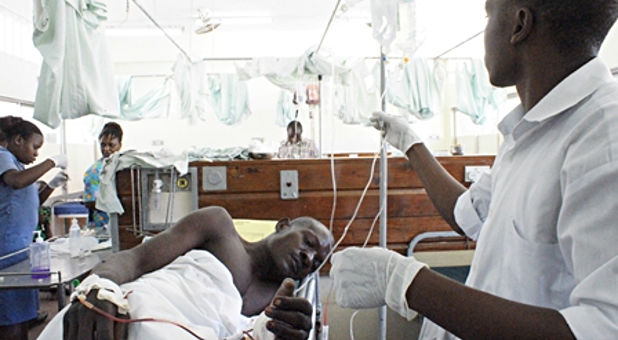Church Gun Attack Kills at Least 6, Injures 21
At least six people have died since masked gunmen stormed a church on Sunday in Kenya’s second city Mombasa, injuring about 21 others.
The armed men, believed to be three or four in number, struck the Joy Jesus Pentecostal Church in the Sinai area in Likoni, on the mainland just south of the island heart of the city during the morning service, killing the church’s Assistant Pastor Philip Masela Ambesta. Two of the attackers had forced their way into the church through a backdoor, after killing a 60-year-old watchman.
“It is painful that someone can walk into church and spray bullets, killing people including children. This is totally unacceptable and the Muslim community have to do something to bring it into an end,” Bishop Benson Muthama of Pentecostal Church Act on Mombasa Island told World Watch Monitor in an interview the morning after the attack.
The Catholic bishop of Malindi and apostolic administrator of Mombasa, away at the time, confirmed this to the Fides news agency: “According to what I was told, a gunman came shooting out of the back door of the church, while the other two accomplices were at the main door to prevent the faithful from escaping. Four people died on the spot and 21 were injured.”
Recently churches in the city have come under increased threats and attacks from suspected Islamists, according to church leaders.
From these trends, according to Benson Muthama, the radical Islamists seem to be sending a signal that they would no longer tolerate Christians on the island.
Only last week, Mombasa police arrested two people driving a car with two hidden improvised bombs, after a tip-off. The target has not yet been identified, but the incident led to a continuing heightened state of alert.
The two faith groups had co-existed peacefully for years, until Kenya sent troops to Somalia in pursuit of al-Shabab Islamic militants who have control of much of Kenya’s eastern neighbor, leaving it as a “failed state.”
When Kenya sent in its army in October 2011, it accused the Somali militants of attacking, killing and abducting its citizens and foreign aid workers. There were also high-profile cases involving snatching tourists from Kenyan resorts which damaged Kenya’s international profile and economy.
As reported by a U.S. private intelligence agency in May 2012, al-Shabab leaders immediately warned that blood will flow in Kenyan cities and towns, Nairobi’s skyscrapers would come down and Kenyan “fragile” citizens would “mourn in pain.”
Since then, a series of attacks involving grenades and improvised bombs have hit churches in Nairobi, Mombasa and Garissa (close to Kenya’s Somali border). In September, radical Islamists claimed responsibility for the Westgate Shopping Mall terrorist attack in Nairobi, where al-Shabab gunmen killed at least 67 people and injured 175.
As Christians began trooping to churches for their Sunday services, the attackers had begun by hunting for a church to attack in the area, according to the Rev. Wilybard Lagho, the Vicar-General of the Mombasa Roman Catholic diocese.
Their first destination was the Consolata Roman Catholic Church and then the famous Pastor Wilfred Lai’s Jesus Celebration Center, a part of Redeemed Gospel Churches (RGC) in Kenya, according to reports of suspicious-looking visitors to both churches which had been passed onto Lagho.
Finding the police on guard, the attackers left to find the Joy Jesus Church apparently unguarded and so attacked it. This is the sixth or seventh time this church has been attacked, one of the church’s pastors told journalists.
In October, an RGC leader in Mtopanga, near Mombasa, was shot dead in church as he prepared for services. His death came days after Mombasa witnessed its worst rioting in recent years after the drive-by shooting of a Muslim Imam, Ibrahim Rogo, itself in the aftermath of the Westgate Mall attack).
According to the Rev. Lagho, this latest attack on Sunday was well planned.
“I think it is meant to cause fear among the Christians, but we urged our faithful to remain calm and not lose hope,” he told World Watch Monitor. “We also think it is made to drive a wedge between Christians and Muslims in the region, and also to drive away tourists.”
Pentecostal Bishop Muthama is concerned about this too.
“Many times it is said sheikhs and pastors are talking to try to defuse the tensions … but I think it’s all hypocrisy. We insist the Muslims must find a way of control their people. Christians have never attacked any mosques. If they continue, I don’t rule out Christians retaliating.
“Nobody is going to wait for a church to be attacked. The churches are not built by the government. We collect money to build them,” he stated.
The attack comes amid concerns over growing radicalization of Muslim youths on the Kenyan coast.
Last month, the police stormed the Masjid Musa Mosque in the Kisauni area to stop an alleged recruitment by al-Shabab. More than 100 people appeared in court in Mombasa accused of being members, as we reported. Police spokesperson Zipporah Mboroki has said security agencies are treating such recruitment as a criminal activity.
“The area of Mombasa is considered the stronghold of an Islamist movement of secession,” added the Catholic bishop to the Fides agency. “These groups even threaten the local Imam, he’s accused of being moderate.
“In Kenya it is believed that these groups are funded by some businessmen in Mombasa. The majority of the members of these groups are young people from Somalia, but there are also local youths who shoot and kill just for money, not because they are religious fanatics. … Pray for us and especially for the conversion of the hearts of these young people, so they do not commit violence,” concluded Bishop Barbara.
















































